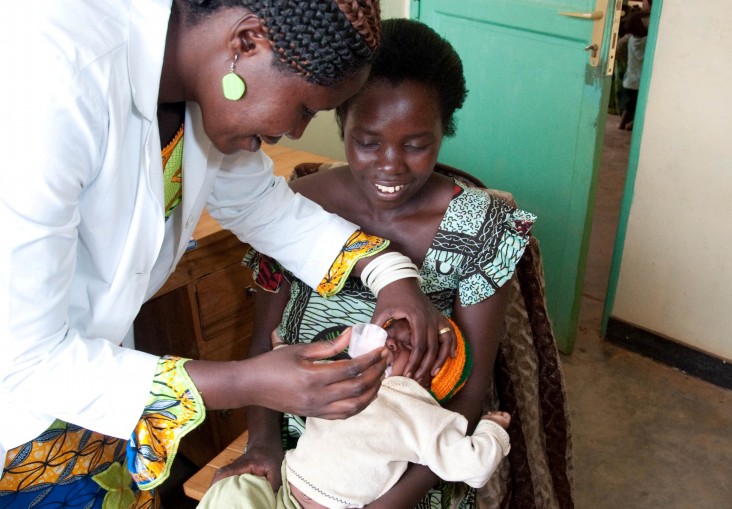
USAID supports the Government of Rwanda’s initiatives to fight HIV/AIDS, and malaria; increase the quality and use of family planning and reproductive health services; improve maternal, newborn and child health; promote increased access to clean water and sanitation, improve nutrition; and strengthen the overall health sector.
The health and livelihoods of Rwandans have greatly improved over the last decade. Men, women and children enjoy better access to lifesaving health services, and indicators point to significant improvements over the past five years.
Despite this progress, Rwanda has some significant health challenges: one child in 20 dies by age 5. Thirty eight percent of children suffer from chronic malnutrition and nine percent of children are underweight and 38 percent are anemic. Although Rwanda is Africa’s most densely populated country, the fertility rate in Rwanda remains high at 4.2 children per woman and maternal mortality is unacceptably high at 210/100,000 births. Rwanda also faces a complex HIV/AIDS epidemic, with a prevalence of three percent among the general population but as high as 50 percent among the most at-risk populations.
USAID supports the Government of Rwanda’s initiatives to fight HIV/AIDS and malaria; increase the quality and use of family planning and reproductive health services; improve maternal newborn and child health; promote increased access to clean water and sanitation, improve nutrition, and strengthen the overall health sector.
HIV/AIDS
Through the President’s Emergency Plan for AIDS Relief, USAID supports voluntary counseling and testing; care and treatment; psycho-social and other support services for people living with HIV/AIDS, orphans and other vulnerable children; and strengthening the medical supply chain system. The United States is the leading donor of bilateral HIV/AIDS assistance to Rwanda.
Infectious Diseases
Rwanda is a focus of the President’s Malaria Initiative (PMI). Through PMI, USAID supports the Government of Rwanda with a comprehensive approach to prevent and treat malaria, supporting four key areas: spraying homes with insecticides, distributing long-lasting insecticide-treated mosquito nets, providing essential antimalarial drugs, and managing malaria cases. In 2017, an estimated 320,000 homes will be sprayed and PMI will procure 1, 000,000 nets to be distributed to vulnerable populations. USAID has supported refresher training and supervision of 355 health workers and 6,053 community health workers on the effective management of malaria at the community level.
Maternal, Child, and Reproductive Health
USAID supports communities, governments and civil society organizations in providing an integrated package of quality, high-impact maternal, neonatal and child health services in a sustainable manner, while promoting good governance and decentralized health services. Building the capacity of nurses and community health workers that deliver the first line of treatment remains a priority. USAID improves nutrition, especially among pregnant women and children under age two. USAID also supports the Government of Rwanda’s national program to increase availability and utilisation of voluntary family planning and reproductive health services.
Health Systems
In addition to improving Rwandans’ health and saving lives, USAID’s health activities support the long-term development of the Rwandan health system. Significant support is provided through technical assistance to the Government of Rwanda for decentralization in the health sector, health policy development, strengthening healthcare financing, improving a pharmaceutical logistics system, and building capacity of service providers and systems.
Water, Sanitation and Hygiene (WASH)
USAID works with community-based environmental health clubs, water management groups, and local sanitation vendors to improve WASH behaviors and services. USAID also works with the Government of Rwanda to improve the capacity of both the Ministries of Infrastructure and of Health in WASH and to build a stronger enabling environment for WASH solutions in country. The results are improved access to clean water and latrines and improved hygiene practices, leading to improved health and reduced stunting among young children.
Nutrition
USAID supports the implementation of Rwanda’s community based nutrition program in more than 10 out of 30 districts. Projects staff supported by community health workers work with pregnant and lactating women and the general public to conduct monthly growth monitoring and promotion to help detect and prevent all forms malnutrition at community level. A total of over 300,000 children under five years are reached together with their mothers and caretakers who receive nutrition education and counseling to improve dietary diversity and maternal and child feeding practices. USAID through its supported implementing partners uses a cost effective community based model of positive deviance hearth model to treat moderate malnutrition among children under five at a village level.








Comment
Make a general inquiry or suggest an improvement.